How Cosmic Horror Made Paganism Great Again

Most readers and writers of cosmic horror show great interest in the ways in which human life can often seem futile and insignificant. Indeed, there is something fundamentally unsettling about the idea that the universe has no meaning and purpose, and that humans themselves are little more than cosmic playthings. However, while this idea may have gained new traction in the relatively nihilistic modern age, it is not itself new. In fact, the notion that humans are insignificant playthings of nature goes back thousands of years, and lies at the heart of nearly all ancient pagan religions.
What is Cosmic Horror?
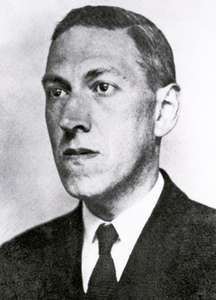
Cosmic horror, broadly defined, is a type of science fiction in which the horror is derived from human insignificance in the face of an uncaring cosmos 1. This type of horror first achieved notoriety thanks to the efforts of H.P. Lovecraft, an early twentieth century author who remains the most famous writer of cosmic horror to this day. Since Lovecraft, many other writers, both in his native New England and around the world, have been expanding upon the genre. Nowadays, cosmic horror can be found in almost any medium, from books to anime and manga to music.
The Underlying Message of Old Pagan Religions
Although many people assume that all religions are functionally the same, there is in fact a clear divide between the pagan religions that used to be ubiquitous and the more rule- and text-based religions, like Judaism, Islam, and Buddhism, that later replaced them in many parts of the world. The Orthodox Jewish writer Ben Shapiro describes the main message of paganism thusly:
Imagine a world in which you are a plaything of nature, or the gods. You have a fate, but you have no true agency over it. You may seek to appease the gods through sacrifices, but they’re as volatile and uncaring as other human beings. Those gods have invested kings and potentates with power; you are a commoner, trying to scratch your life from the dirt. You comfort yourself with the things around you, with simple pleasures; perhaps you even find communal meaning in service to the regime. But you are essentially a cork, bobbing on the eddies of an ocean you do not control–an ocean no one truly controls.
2
Along similar lines, another Jewish writer named Liel Leibovitz describes paganism as claiming that “the world is not much more than the sum of its malevolent forces, and that the best we mortals can hope for is not to get caught in the crossfire of the war between the deities. 3” Although this is likely an oversimplification of pagan beliefs, what’s noteworthy about it is that it almost perfectly describes the worldview of cosmic horror. Indeed, many famous cosmic horror writers were interested in paganism, and the pagan worldview manifests in cosmic horror in a number of very interesting ways.
Cosmic Horror’s Pagan Influences
H.P. Lovecraft, the man who arguably did more than anyone else to define the cosmic horror genre, was both a staunch atheist and a dedicated pagan enthusiast 4. He often idolized pagan cultures, such as those of Ancient Egypt, Greece, and Rome, believing (likely erroneously) that he and others like him would be on top in such societies 5. Some of his stories even directly reference these cultures. For instance, the elder god Nyarlathotep is noted to occasionally take the form of a human pharaoh; The Rats in the Walls takes place on what was once a pagan ritual site; and the sea-god Dagon shares its name with a deity that was worshiped in ancient Mesopotamia 6.
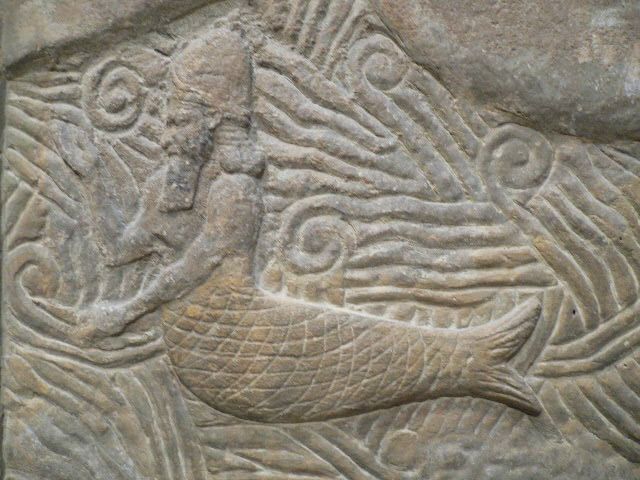
The Role of Nature
Religions like Judaism and its offshoots claim that humans occupy a special place in nature, and that serving God will convince him to share nature’s abundance with them. Pagan religions, by contrast, have generally tended to view humans as being at the mercy of nature. Depending on the circumstances, nature could be benevolent or wicked, but either way it had to be appeased. The Aztecs, for instance, believed that the sun would only rise in response to blood sacrifices 7. On the flip side, the ancient Mesopotamians worshiped an evil god known as Pazuzu, who was believed to engender droughts, in hopes he would grant protection from other evil deities 8.
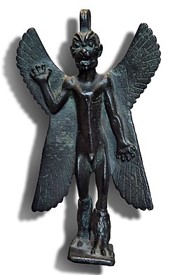
In Lovecraft’s stories, nature takes on a similarly forbidding bent. The best example of this can be seen in The Color Out of Space. In this story, an asteroid that lands on a farm property unleashes an evil force that starts sucking the life out of its surroundings–first the crops, and then the livestock, and eventually the people who live there. Thus, one way to interpret this story is as a modern manifestation of historic anxieties about having enough food to eat. A farmer in ancient Mesopotamia, for example, might starve to death if his barley fields flooded or dried up. Lovecraft’s more modern characters are not so dependent on the weather as such, but they come to appreciate their own helplessness in the face of an uncaring environment when faced with an alien color that both destroys their food source and prevents them from escaping.
More subtle versions exist as well, however. For instance, most of the action of The Whisperer in Darkness takes place in the isolated Vermont mountains. These mountains are in reality extremely beautiful, but in Lovecraft’s telling their isolation has made them the perfect base for a race of evil aliens called the Mi-Go.

Caitlin Kiernan is one modern author who often writes about nature’s harsh and unforgiving qualities. In her novel The Red Tree, for instance, a writer and a painter become convinced that an ancient oak tree on their property is an evil spirit that has haunted the land for centuries. More broadly, most monsters and beings in her stories are associated with features of the natural world, such as mushrooms and water.
Physical Gods
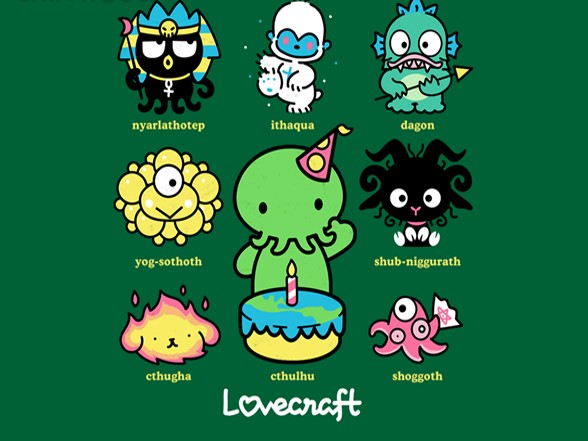
Many pagan religions feature gods who are a part of physical nature in much the same way as people are. The Ancient Greeks, for instance, believed that their gods were people who lived in a place called Mount Olympus in northern Greece. They also believed that some of these gods and goddesses interbred with mortals 9.
Similarly, many of Lovecraft’s most famous monsters–including Cthulhu, Yog-Sothoth, Nyarlathotep, and Shub-Niggurath–are described as being gods. These gods freely visit Earth and sometimes show themselves to humans, either to intimidate or obtain something from them. They can also interbreed with humans, most notably in The Dunwich Horror, where the half-human hybrid Wilbur Whateley is revealed to be the son of Yog-Sothoth.
The anime Madoka Magica contains another take on this type of character in the form of Kyubey. Although Kyubey is never explicitly stated to be a god, his powers are certainly godlike. He offers to grant wishes to young women and, in return, transforms them into super-powered magical beings known as magical girls, who fight evil witches. Unfortunately these magical girls are fated to eventually become witches themselves, at which point Kyubey harvests their emotional energy. One of the more unsettling implications of the series is that all young women of any historically noteworthy accomplishment whatsoever were once magical girls. This notion may seem rather elitist, but it fits neatly in with the view, common in pagan religions, that to achieve fame, fortune, or meaning requires being anointed by a god.
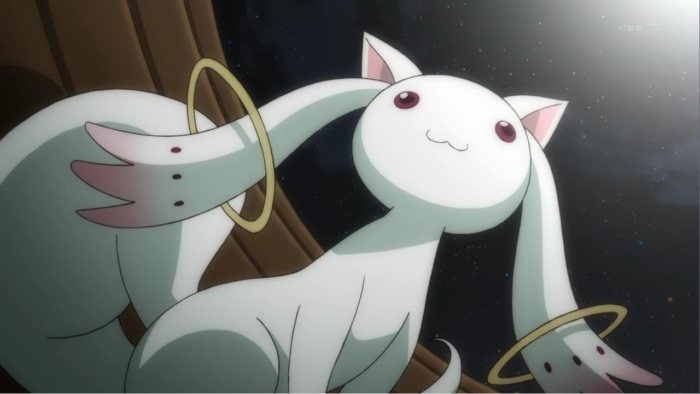
Subjective, Situational Morality
In a religion like Judaism, God elucidates a particular moral code that all of humanity is bound by. Its offshoots, Christianity and Islam, sometimes take things even further and argue that the only good people in the world are their coreligionists. Followers of these religions may still do things that are morally reprehensible, but they justify it by claiming that they are so much more righteous than their enemies. Most pagan religions, by contrast, tend to have looser and more subjective definitions of what’s morally acceptable and what’s not. Cosmic horror, similarly, denies the existence of any objective morality and frequently features characters doing whatever they feel they can get away with.
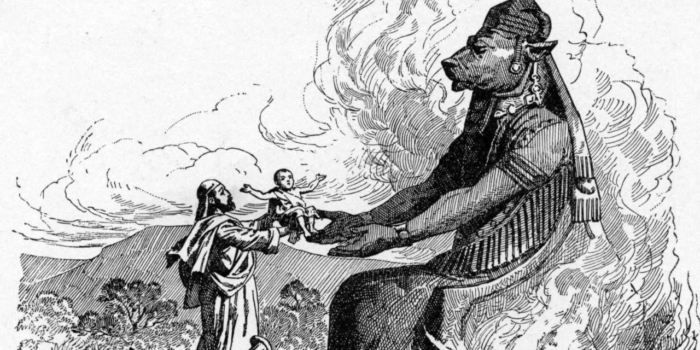
The most blatant form this subjective morality can take is human sacrifice. Examples of human sacrifice in the pagan world are legion, with every continent seemingly seeing at least one example 10. Many of Lovecraft’s stories–including The Call of Cthulhu, The Dunwich Horror, and The Dreams in the Witch’s House–reference human sacrifice, as does The Red Tree.
More subtle versions of subjective morality occur in these legends and stories as well, most of which center around the idea that might makes right. For instance, in one version of the Ancient Greek story of Medusa, she was originally a victim of sexual assault, who was subsequently cursed with the ability to turn people into stone. Sometime later Perseus beheaded her 11. From a modern perspective this story may seem horribly unfair. However, the Ancient Greeks weren’t interested in objective notions of fairness, but only in power.
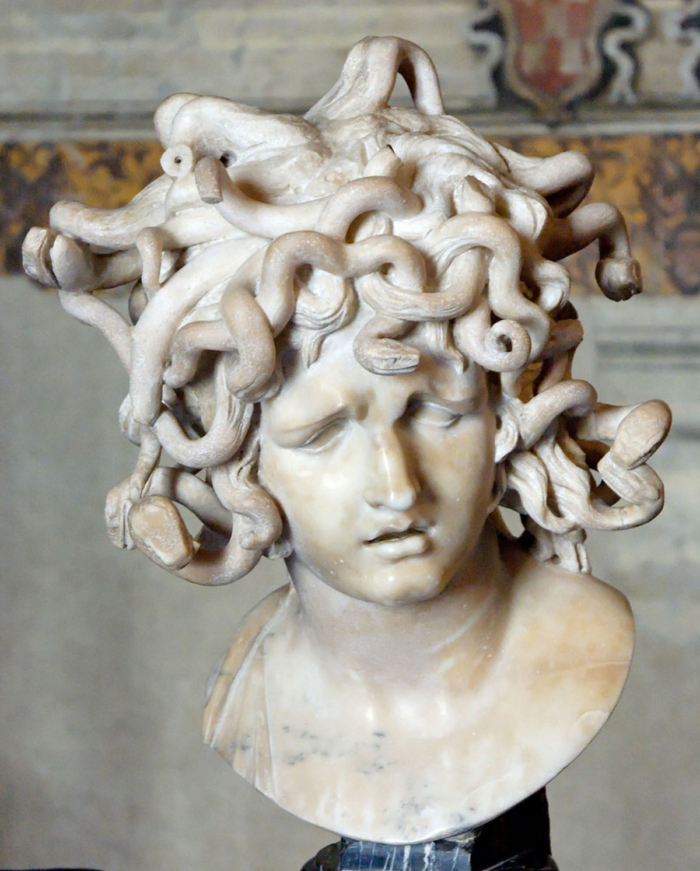
The novella The Ballad of Black Tom, which reimagines the events of Lovecraft’s The Horror at Red Hook from a Black person’s point of view, contains one of the more interesting examples of this sort of subjective morality in cosmic horror. The central character, a young Black musician named Charles Thomas “Black Tom” Tester, is by all appearances a selfish, amoral character who traffics in illicit occult merchandise, stores pages from a forbidden book inside his own father’s guitar, scarcely shows the slightest scrap of empathy for or indeed interest in anyone outside his own immediate family, and ultimately unleashes an elder god to destroy the world as vengeance for the racism he suffers. The White characters he interacts with are, if anything, worse. After all, they’re the ones who are oppressing him just because he’s Black. In other words, the world that Black Tom inhabits has no time for objective moral standards. Its only currency is power, and those who have power are free to do whatever they want with it.
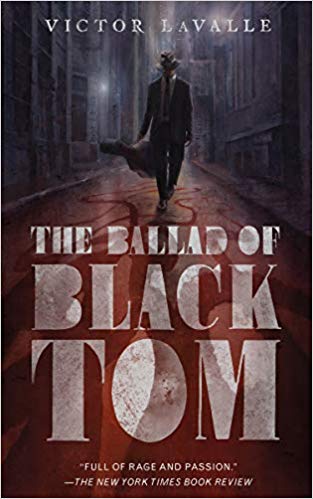
Interestingly enough, many of the characters in Lovecraft’s own body of work show a similar disdain for objective notions of morality. The following passage in The Call of Cthulhu is illustrative:
[The cult of the Great Old Ones] would never die till the stars came right again, and the secret priests would take great Cthulhu from His tomb to revive His subjects and resume His rule of earth. The time would be easy to know, for then mankind would have become as the Great Old Ones; free and wild and beyond good and evil, with laws and morals thrown aside and all men shouting and killing and reveling in joy.
12
The Role of Salvation (Or Lack Thereof)
Many modern religions promise glorious salvation to anyone willing to work hard enough at following their precepts. Christianity and Islam teach that the faithful go to heaven after they die 13 14. Buddhism teaches that anyone who commits themselves to following the path of the Buddha can reach enlightenment and be delivered from suffering 15. Certain branches of Judaism teach that the whole world will achieve salvation someday 16.
In many pagan religions, by contrast, salvation was limited to a select few special people, if it existed at all. In the Aztec culture, the only people who could go to the highest heaven were warriors who died in battle, women who died in childbirth, and sacrifices 17. Ancient Greek myths, meanwhile, generally spoke of the afterlife as an unhappy place, where everyone was the same regardless of the life they had lived on earth 18. Some myths mention a paradise known as the Elysian Fields, but it was reserved for those related to or patronized by the gods 19.
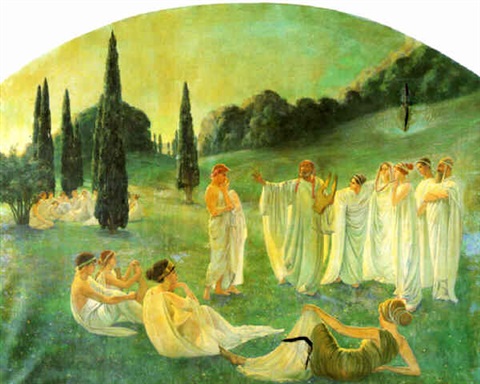
Along similar lines, cosmic horror stories generally disavow salvation, either before or after death. Lovecraft’s stories never hold out hope of any sort of universal justice or afterlife, instead focusing on the attempt to conquer death through scientific means (as in Herbert West: Reanimator). Indeed, in his early story The Statement of Randolph Carter, the title character reflects on the death of his friend, Harvey Warren, by hoping that he is “in peaceful oblivion.”
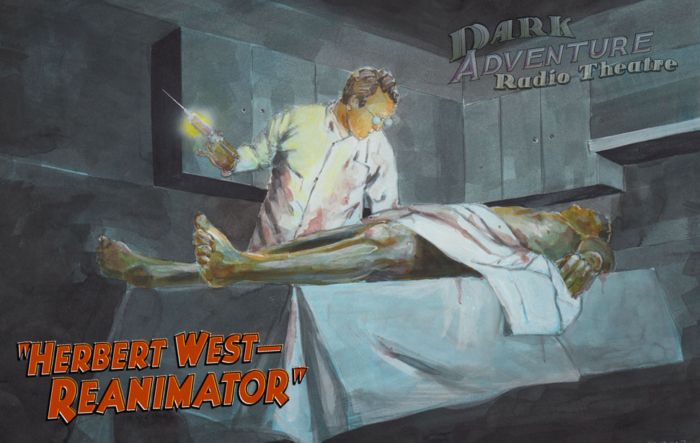
A more modern take on salvation (or lack thereof) in cosmic horror is the story of Charlie the wanna-be ghost from the Night Vale novel It Devours! Charlie is willing to face Night Vale’s formidable bureaucracy in an attempt to secure a coveted haunting permit, which will allow him to come back as a ghost after death instead of ceasing to exist. When at last he receives one, he feels eternally grateful and superior to everyone else. His story is, in effect, a satirical take on the idea of salvation for the fortunate few.
In general, one of the easiest ways to identify cosmic horror entails observing how a narrative treats death and the afterlife. If a story states or implies that a large proportion of the cast will go to heaven, then that story cannot be true cosmic horror no matter how depressing it is or how many scary monsters it has. To be true cosmic horror a story must hold out no hope for salvation, or else treat salvation as something outside of one’s own control.
Lovecraftian Chick Tract Parodies
The Chick Tracts are an infamous set of comic strips expounding upon the author’s views of Christianity. Their notoriety has made them popular targets for parody, and in the 2000’s, two Lovecraftian parodies were produced. The earlier of the two, titled Why We’re Here, features a man who kills himself and his family after Wilbur Whateley reveals the true nature of the universe 20. The other and better known comic is called Who Will Be Eaten First? and features an older man warning his son that Cthulhu is about to rise and destroy humanity 21.
Many people who read these comics conclude that Jack Chick’s Christianity and Lovecraftian horror are fundamentally the same. However, this is a misreading. The key difference is that the Chick Tracts constantly dangle salvation in front of the readers. Their primary message is that, if only the readers will do what the tract says to do, then they will go to heaven. By contrast, both of the Lovecraftian parodies make it clear that there is no heaven or salvation of any sort, and that the best that humans can hope for when the Elder Gods return is to have a fast death.
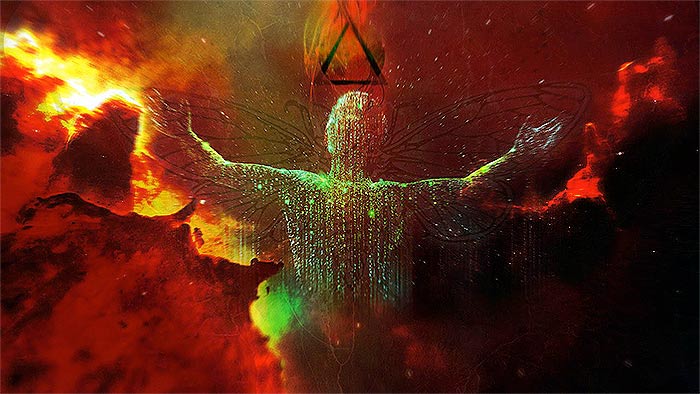
From its earliest days, cosmic horror has been influenced by paganism, and particularly the pagan belief systems that existed long ago. Lovecraft himself adored paganism and rejected mainstream Christianity. The difference, of course, is that in his lifetime such a viewpoint was unusual. Nowadays, it’s become a lot more mainstream.
One of the notable differences between modern cosmic horror and older works such as those written by Lovecraft lies in the resignation of the characters and narrative to the meaninglessness of their lives. In Lovecraft’s own day, the idea that the universe was empty and meaningless seemed genuinely daring and, therefore, scary. However, more recent works like Welcome to Night Vale and The Ballad of Black Tom simply take it for granted. The reason for this is likely that religions like Christianity, which could once be counted on to provide life with meaning, no longer carry the influence they once did. It’s notable as well that Lovecraft’s works didn’t sell well in his own lifetime, and only received widespread popularity after his death. According to one source, attempts to find actual meaning in Lovecraft’s work took off in the 1970’s 22, which, coincidentally, was also just a couple of decades after religious observance had begun to decline 23.
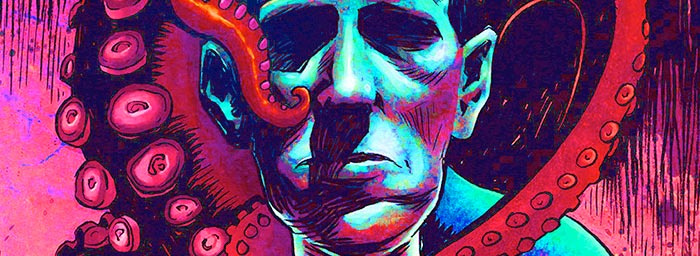
The Jewish scholar Moishe Koppel writes:
[D]eveloped religions like Judaism serve to subdue the instinct for idolatry and primitive religion, the kind that encourages superstition, self-debasement, seclusion of untouchables, and human sacrifice.
24
He further goes on to warn of “primitive religion reasserting itself in the absence of developed religion.” As society drifts further from conventional religions, people will naturally gravitate toward alternative ways of understanding the world, including cosmic horror with all its pagan undertones. In the end, humans as a species appear to be programmed to want to believe in something, and even the wicked Cthulhu is easier to believe in than nothing at all.
Works Cited
- “Cosmic Horror Story.” TVTropes. Retrieved from https://tvtropes.org/pmwiki/pmwiki.php/Main/CosmicHorrorStory ↩
- Shapiro, Ben. The Right Side of History. HarperCollins Publishers, 2019 ↩
- Leibovitz, Liel. “We’re All Pagans Now.” Tablet Magazine, 17 November, 2017. Retrieved from https://www.tabletmag.com/jewish-life-and-religion/249477/we-are-all-pagans-now ↩
- Gray, John. “Weird realism: John Gray on the moral universe of HP Lovecraft.” New Statesman America, 24 October 2014. Retrieved from https://www.newstatesman.com/culture/2014/10/weird-realism-john-gray-moral-universe-h-p-lovecraft ↩
- Lovecraft, Howard P. “Cats and Dogs.” Retrieved from http://www.hplovecraft.com/writings/texts/essays/cd.aspx ↩
- Stone, Adam. “Dagan (god)”. Ancient Mesopotamian Gods and Goddesses, Oracc and the UK Higher Education Academy, 2013. Retrieved from http://oracc.museum.upenn.edu/amgg/listofdeities/dagan/index.html ↩
- “The Aztec Empire: Society, Politics, Religion, and Agriculture.” History on the Net, 2000-2019. Retrieved from https://www.historyonthenet.com/aztec-empire-society-politics-religion-agriculture ↩
- Graff, Sarah. “Pazuzu: Beyond Good and Evil.” The Met, 29 September 2014. Retrieved from https://www.metmuseum.org/exhibitions/listings/2014/assyria-to-iberia/blog/posts/pazuzu ↩
- “Gods and Goddesses.” The British Museum. Retrieved from http://www.ancientgreece.co.uk/gods/home_set.html ↩
- Parker Pearson, Mike. “The Practice of Human Sacrifice.” BBC – History. Retrieved from http://www.bbc.co.uk/history/ancient/british_prehistory/human_sacrifice_01.shtml ↩
- Freedman, Philip. Oh My Gods: A Modern Retelling of Greek and Roman Myths. Simon & Schuster, 2012 ↩
- Lovecraft, H.P. The Call of Cthulhu. Retrieved from http://www.hplovecraft.com/writings/texts/fiction/cc.aspx ↩
- Catholic News Service. “Pope Francis: Paradise is not a fairy tale or enchanted garden.” Catholic Herald, 25 October 2017. Retrieved from https://catholicherald.co.uk/news/2017/10/25/pope-francis-paradise-is-not-a-fairy-tale-or-enchanted-garden/ ↩
- Huda. “Definition of Jannah in Islam.” Learn Religions, 8 April 2019. Retrieved from https://www.learnreligions.com/definition-of-jannah-2004340 ↩
- Landaw, Jonathan et al. Buddhism for Dummies. 2nd ed., Wiley Publishing, Inc., 2011 ↩
- “Moshiach: An Introduction.” Chabad.org. Retrieved from https://www.chabad.org/library/article_cdo/aid/1157486/jewish/Moshiach-An-Introduction.htm ↩
- “Aztec Religion.” Encyclopedia of Death and Dying. Retrieved from http://www.deathreference.com/A-Bi/Aztec-Religion.html ↩
- “Death, Burial, and the Afterlife in Ancient Greece.” The Met, October 2003. Retrieved from https://www.metmuseum.org/toah/hd/dbag/hd_dbag.htm ↩
- “Elysium: Greek mythology.” Encyclopedia Britannica. Retrieved from https://www.britannica.com/topic/Elysium-Greek-mythology ↩
- Van Lente, Fred & Steve Ellis. “Why We’re Here.” Retrieved from http://www.fredvanlente.com/cthulhutract/ ↩
- Cyriaque, Lamar. “Who Will Be Eaten First? — a Lovecraftian parody of Chick Tracts.” Gizmodo, 24 January 2011. Retrieved from https://io9.gizmodo.com/who-will-be-eaten-first-a-lovecraftian-parody-of-c-5742032 ↩
- Quinn, Dennis P. “Cults of an Unwitting Oracle: The (Unintended) Religious Legacy of HP Lovecraft.” Popmatters, 19 August 2010. Retrieved from https://www.popmatters.com/cults-of-an-unwitting-oracle-the-unintended-religious-legacy-of-h-p-lovecraft-2496158350.html ↩
- Eberstadt, Mary. How The West Really Lost God. Templeton Press, 2013 ↩
- Koppel, Moishe. “Saint Amber.” Judaism without Apologies, 17 August 2017. Retrieved from https://moshekoppel.wordpress.com/2017/08/17/saint-amber/ ↩
What do you think? Leave a comment.











What is your definition of “pagan”? Are you using it as a synonym for polytheistic religions?
No, that’s not it. The pagan religions, in this context, are those that meet all of the criteria that I list in the article. You can have a pagan religion that doesn’t include the involvement of gods at all. My point is simply that cosmic horror writers didn’t invent the idea of an uncaring universe or uncaring gods; it already existed, in these ancient pagan religions.
*that is to say, they include all the criteria except, occasionally, the physical gods. But most of the criteria I listed should be there, especially the views on morality and salvation.
Which criteria? I don’t see a clear set of criteria anywhere in the article. You start out by assuming that “paganism” is a familiar concept, and then you go on to describe some attributes of paganism. It is not clear which of the attributes you describe form your DEFINITION of paganism.
If you just say “paganism is those religions that fit my whole description”, then your article becomes a “No True Scotsman” fallacy IMO.
Paganism is a form of different religions that are centered in nature!
In some circles, I’ve never understood why paganism is called “New” Age. Nothing new about it. “New” Age paganism is far older than the conventional religions of Christianity, Judaism and Islam – they’re the ones which should be called “New”. So called “New Age” paganism goes way back to ancient times.
Well, sort of. The thing about a lot of “new age” style neo-paganism is that it developed in societies that were already (usually) Christianized long before. So it’s very hard to tell where the Christian (or Buddhist, or Hindu…) influences end and pagan influences begin (I remember attending a Beltane fire circle-style ceremony at my university, and it was basically just a hippie-ish appreciation for the change of seasons). The thing about cosmic horror is that it’s drawing from a worldview that does not recognize the teachings of Christianity (or Islam, or Buddhism…) at all.
I don’t think it’s polytheistic religions. If Debs is counting a lack of salvation is a defining feature of his idea of “paganism”, that doesn’t exactly match with Hinduism-a polytheistic religion which promises the possibility of achieving a higher purpose if you do the right things.
“Cosmic horror, similarly, denies the existence of any objective morality and frequently features characters doing whatever they feel they can get away with.”
Lovecraft’s fiction is more moralistic than you give it credit for. In stories with a human villain, the villain almost universally gets his comeuppance at the end. Herbert West, Crawford Tillinghast, that sorcerer in “He”, Surama and a few others.
In a vague general sense I believe in the uncontrollable powers of nature and that there are creatures that want to devour you, but if I was in the ocean I’m more concerned over shark attack than a Deep One grabbing me.
I know I probably don’t have a clue what I’m talking about, but I’ve always felt Cormac McCarthy’s Blood Meridian to be a masterpiece in Cosmic Horror, even though it’s a western set in the 1850’s about the american spread into the west, though an incredibly moody and atmospheric one at that. There’s just something so ominous and cerebral about it, especially the character of The Judge, this seemingly immortal, omnipresent, and omniscient man, if it even is one. The vast bleak hellscape of the old american frontier, the blood drenched skies, the feeling of impending doom, and the presence of some great and truly unknowable evil out there (a metaphor for the inherent violence of humankind), all conveyed in such a subtle way, like a parasite at the back of your mind, eating away at it slowly as you read on. It’s the stuff of nightmares.
That’s actually quite a good point. I haven’t actually read the book you mention (though I’ve read bits and pieces of it, and know the basic plot outline) but it’s important to note that cosmic horror doesn’t have to obviously include monsters or magical beings. The basic idea of a monstrous, lawless place with no higher authority to answer to is in and of itself pretty Lovecraftian.
As an admirer of H.P.Lovecraft’s literature work i want to applaud this article.
I think the best cosmic horror movie I’ve seen was it follows. Mainly because the monster is never understood or even seen in it’s true form. And we don’t know why it does what it does.
I have had an idea for a movie that has a large bio spacecraft cloaked coming down on to one of our remote highways at night and eating or taking up vehicles and people from the highway like a blue whale with krill. The scenes would be nightmarish when the vehicles are eaten by the bio- spaceship.
Shaw, you might like “Blackout” by Tim Curran. It is similar to the premise you describe.
Do anyone believe in the cult of Cthulhu?
People think it’s cool to say they’re a cthulhu cultist and never stop to think about the atrocities they’d have to commit if they were really what they say they are. Worshipping the “source of all madness and nightmares” isn’t exactly the same as sleeping through a boring sermon every sunday.
I agree and I think it stems from the fact that we’re so far removed from a time when “pagan” views of morality were the only game in town.Remember that in many times and places throughout human history nobody saw anything wrong with human sacrifice, or with bribing merciless, evil gods to grant their specific wishes (for example). That’s the mindset that someone who worshiped the Elder Gods would have to go back to. To be a true Cthulhu cultist you’d have to, for instance, let go of the very idea that there was anything wrong with killing people (in human sacrifice to Cthulhu, at least).
Somebody claiming to be a cthulhu cultist is either A: full of shit, or B: on the FBI most wanted list with a body count rivaling Bathory. Cthulhu is EVIL. Not “i hate my parents because they won’t buy me an ipad” evil, but “i torture infants with a steak knife” evil. You cannot function in civilized society and worship a being that makes satan look like nothing.
I love Lovecraft’s stories but I think you’d have to be daft to think they’re anything but fiction. Obviously, that goes for all fictional stories ever. Liking something does not make it real. Otherwise I should’ve been accepted into Hogwarts a long time ago (and yes, I refuse to accept the possibility that I am simply a muggle and thus was never invited).
But I do find the fundamental darkness of Lovecraft’s world, the nihilism which fuels most of his stories, pretty appealing, from a philosophical point of view.
Makes as much sense as any other religion I guess…
Do christians like the works of lovecraft?
No. All Christians dislike HP Lovecraft in favor of Stephen King. We also prefer flat paint to satin finishes, dislike bananas, and will always take a Tic Tac when one is offered.
I do, but I don’t speak for all Christians. I don’t care for the racism, and some of his stuff is awful. But some of his more well thought out stories are very enjoyable. I can abstract it from my faith.
Absolutely love Lovecraft! I’ve always been very into the horror genre as a whole. Thomas Ligotti is a great contemporary writer who is deeply inspired by Lovecraft, but takes it in a more modern direction.
I guess I don’t see why Christians wouldn’t like Lovecraft. To me it’s the same as asking “Do Christians like chicken pot pie?” I’m sure some do and some don’t, but I don’t think it has anything to do with their religion.
Put it this way–I’m a fairly religious Jew and I enjoy reading Lovecraft. People read all kinds of things for any number of reasons, but it doesn’t mean they always take them to heart.
I actually love the works of H.P. Lovecraft. Partly for his fantastic creativity, and part for the way that he uses language itself. It just brings me a deep joy to see the beauty of his writing and the creativity of his ideas. If anything, I think this kind of creativity and mastery of language (as well as beauty of any kind) has the potential to reflect God’s nature, because both beauty and a creativity are important characteristics of God.
Yes, his themes can be a bit dark and I wouldn’t recommend them to everyone (in particular, I wouldn’t recommend them to people who are extremely spiritually curious or impressionable), but I personally really enjoy them.
If you’re into lovecraft and books about witchcraft and you haven’t read The Croning by Laird Barron, you need to resolve that immediately. For the most part, the witches are never outed as traditional types of witches, at least to the protagonist, but you’ll recognize exactly what they are. Also, it’s a fun take on witchcraft because it isn’t about a coven worshipping the devil, but instead a coven worshipping something much much worse.
Just read this recently. Very creepy and unsettling novel. Looking forward to reading more or Laird’s work.
He is the most unsettling author I’ve ever read.
Any good cosmic horror films you could share?
Stephen King’s “IT” is cosmic horror and I believe directly inspired by Lovecraft, though I remember the first one, at least, being a little more upbeat than most of Lovecraft’s works (relatively speaking, at least). There’s also the movie version of “1408,” which was made many years ago based on a Stephen King short story; and some folks have cited “Ghostbusters” (the first one, at least) as a more lighthearted take on the cosmic horror genre as well.
I know Only big names tbh. The Thing (Carpenter), Annihilation, It (arguably), reanimator, Eraserhead (I guess), 2001: A Space Odyssey, The Mist, Sunshine (it’s alright), Event Horizon (also ok). I’ve never seen it but Solaris, a russian/Soviet film, might be up there, too.
Bloodborne is the best game with cosmic horror theme and aesthetics in my opinion. If you’re into games instead of films. 🙂
Quatermass and the Pit. Either the 50’s BBC serial (the whole thing was on Youtube last time I looked), or the 60’s Hammer movie adaptation. Heavily inspired by Lovecraft, especially stories like At the Mountains of Madness
Workmen dig up what they think is an unexploded WW2 bomb, and call the military, until a scientist realises it is something ancient that could have grave consequences for mankind.
I recently saw The Void, surprisingly good cosmic horror. The combination of cosmic horror, with an ancient malevolent entity “older than time itself”, and the surgical experiment gore, left me with Lovecraft and Barker vibes. I tend to gravitate toward those genres, if I’m watching evil on the screen I’d rather it be an all encompassing, foreboding evil.
I love the practical effects. I also loved the art style and the people in the white outfits – whatever we’ll call them. To me the only thing I did not think was the best – was the actual plot itself. quite a few “huh?” moments and feel the story could have definitely been better. but I loved everything else about it
One of my absolute favorite newer horror flicks. I love the practical effects and homage to Hellraiser/Lovecraft stuff.
You should check out Aztec mythology. Even the names are lovecraftian.
How about The Trinity Church of the Spirit, presently dormant but in its day a cover for the invocation of Daoloth and his powers.
The Sumerian gods have always seemed lovecraftian to me in their utter distain for human well-being.
They might be shaped like humans, but they behave as huge, indifferent cosmic forces. Come to think of it, the Old Testament God is like this too, in my opinion, he just takes an interest in one human tribe- although the actual experience of that interest, from the tribe’s point of view, seems debatable, both in terms of benefit and consent.
The Bible is an example of cosmic horror! Because there’s this big guy in the sky who you have absolute no hope defeating, who sends his own creation into hell to burn forever simply for not knowing who he is.
Sadly, contemporary cosmic horror is like the old Scooby-Doo. The creeping chaos and unfathomable evil turn out to be some megalomaniac already-rich guy who wants absolute dominion and is willing to sacrifice everyone ELSE to achieve it. Better to reign in hell for a short time while the world ends than retire to Tahiti. Reminds me of Amway. Joooiiin ussss.
I love this genre. There’s no limit to what you can create. One idea I have thought about a lot is the revelation and truths of the universe that seem to bring one to madness don’t actually stem from some grandiose arcane insight that is incomprehensible, but rather a lack of mystery and fantasm.
The thing the truth is that there is nothing greater than one’s self. There is nothing more complex than the human mind and form. To think that for all its wonders the dark secrets of the universe could actually be understood by any average Joe is what drives people mad.
I think is a poignant reflection of our disillusionment with the world as we experience it ourselves one and all. It’s relatable, it brings with it a sense of existential dread, and the real “monster” is the information and the interaction it has with the beholder; completely abstract.
This is great content. Thank you.
Most of the Lovecraftian books on pagan are thinly guised Satanism, but a couple are more closely rooted in the Mythos, albeit many of those are closer to the Simon Necronomicon. I have found a few that are firmly rooted in only Lovecraft’s work, but they are few and far between.
I love cult/coven themed horror movies. I loved Hereditary, Rosemary’s Baby, and both Suspirias, so I have a bias. These genres entice me into looking at dark themes and what events they were inspired by. Cosmic horror is the only specific genre that surpasses, personally.
Very intriging thesis. Lovecraft was quite convinced by Margaret Murray’s The Witch-Cult in Western Europe and taken with its central thesis of the “witch-cult hypothesis” of a continent-wide occult network of worshippers of the mysterious Horned God. As a serious work anthropological scholarship, it’s been generally discredited, but it still has its neo-pagan proponents today. It shows up specifically in “The Horror at Red Hook” and “The Call of Cthulhu” and arguably influences “The Dreams in the Witch House” and “The Very Old Folk”. Nyarlathotep has lately been linked to the Horned God (because of course he has).
Some people believe HP Lovecraft’s dreams were visions, and that he infact was a messenger of the Old Ones. Honestly, to me it’s unsettling.
A reason why cosmic horror is getting harder to do is because nihilism and atheism is becoming more and more common and excepted bt society .
I have always preferred the forgotten cosmic horror: our own worthlessness.
Imagine: By some incidental happening someone encounters the utterly alien mind of a cosmic creature. The brain waves create literally random patterns, incidentally firing off parts of the brain. The creature, hasn’t a clue. The human, feels graced by the divine. The random images, like a fever dream or near death experience are interpreted by the person, pieced together into a thing of deep meaning. They use the random firing then even more random thoughts they think are messages from the creature to form highly specific rituals and spells of the cult. They create a name, a pantheon, everything. Out of nothing. The creature exists, but has no clue the humans exist. Or if somehow it does, they’re not even bugs. They’re like molecules, less than willful things. Worthless. There is no cult with power. Just delusional misinterpretation of random chance. Like a religion, but…
Huh…
One of my favourite types of cosmic horror is auditory, such as welcome to night vale, or alice isn’t dead. They use music to set tone , and make existentialism easy to consume, sometimes it feels as though all the information is slowly sinking into your brain. These stories toy with multifaceted concepts like our own humanity, the roles we have in the world, and how people, as well as our own minds deceive us.
Man I love this type of horror.
Cosmic Horror is by far one of my most favorite genres. It is that unknowable, unexplainable, incomprehensible thing. A greater thing then our mortal minds can perceive. It’s like well I have a theory that despite all our history, all our mythology, there is no way to draw god. Sure Zeus is a bearded human carrying a thunderbolts in a toga and Anubis is a jackal headed human etc but these are pretty easily perceivable things. It’s because of our associating with the human form. But god, any god if such a thing exists would be entirely out of our own comprehension. If it we’re to manifest it would know to take a form our mind can understand. The Percy Jackson series understands this and says that no mortal can look upon a god in it’s true form.
As silly as it sounds, I’ve considered starting a Lovecraftian “cult” of my own, of course as nothing more than a tongue-in-cheek, strictly for fun thing that would only get serious when some knucklehead said “FrEdOm Of ReLiGiOn Is NoT fReEdOm FrOm ReLiGiOn”.
Yeah? Well Yog-Sothoth Neblod Zin, buddy-ro.
This article is deeply flawed in that its ‘paganism’ is an entirely Christian (or Jewish from the quotes) conception of ‘the other’ that crushes diverse cultures together to make a imaginary position the author can do whatever they want with.
Ancient Egyptian religion had a concept of salvation.
Norse paganism apparently happily adopted a positive eschatology in line with its Christian Frankish neighbors.
Pagan Greek philosophy had a concept of moral virtue.
Pagan societies had law codes in books. There was no concept of the secular in classical Greece and Rome, the laws of Greek city states and the Roman Empire were considered to be just as sacred as the Jews treated their torah.
Rabbinical Judaism and Islam both have concepts of situational morality.
Ovid’s Medusa story isn’t about ‘power’ its about the purity of sacred space, a concept pretty in line with the Biblical book of Leviticus.
Lovecraft’s paganism is the evil paganism of the more explicitly Christian horror tradition that he was influenced by. His atheism just meant that there wasn’t a god to save you from the devil.
You know, now that I’ve been giving it critical thought, Lovecraft’s themes seem to me more depressing than scary. The idea that we’re just some insignificant speck in a vast, unfeeling cosmos is kind of common knowledge and isn’t that terrifying which only makes Lovecraft’s works seem more like the creation of a frustrated nihilist being irrationally afraid of everything he doesn’t understand…which is exactly the case.
My personal theory was that Lovecraft was somewhere on the autism spectrum, and that’s why he was so nihilistic and scared of everything.
As much as I love Cosmic Horror, there are many things in Lovecraft’s work that point to his failings as a student and his failings to be as a compassionate human being. His xenophobia towards anyone who was different disturbs me above all. Even some of his contemporaries would’ve agreed with me on that front.
Fear of a lack of control, that’s true terror. When we realize we are not the masters of our own lives, not 100% in command…that’s when that choking feeling of helplessness sets in. Not able to do anything but stand there, not run but stand there shaking with fear as if paralyzed by something in dark, staring right at us. I just love good Cosmic Horror I think it’s the perfect genre for exploring the idea “dis-empowerment fantasy” or ‘somber’ fantasy.
For movie lovers, I’d recommend these three for their cosmic, Lovecraftian influences.
* The Ritual (2017)
* A Dark Song (2016)
* In the Mouth of Madness (1994)
Really loved The Ritual, didn’t get any cosmic/Lovecraftian vibes from it though.
That’s because it’s not cosmic/Lovecraftian in any way. It’s just a pagan cultist movie.
Great reading!
I remember watching Space Odyssey with my parents as a young child. I can remember nothing of what the film was about, only the feeling it left me with – strange, unadulterated dread. It was like I felt foreign in my own skin, distantly horrified, and horribly confused all at the same time. That’s the best explanation I can give of the unexplainable. Whenever I dream of space, I feel the same thing. It’s truly one of the most terrifying sensations I have ever experienced.
Cosmic Horror is often reduced to body horror or a monster movie on the big screen. Cosmic Horror doesn’t need a monster; isn’t the fear of the unknown and the fear of our place in the universe, the indifference god(s) and the universe is towards us.
The reason for cults is because the whole world and even universe is being controlled. People begin cults are accepting the calls from the elder ones.
What the cults get out of it is spelled out pretty clearly in Lovecraft’s stories: an eternity of orgies and violence. Which is pretty cool.
Thanks, great little read – who doesn’t love cosmic horror?
Reading Edgar Cantero’s Meddling Kids atm, so cosmic horror very much at the forefront of my mind. It’s a great novel and a fascinating article to compliment it. Thanks.
p.s. Great Lovecraftian podcast by the BBC – Whisperer in Darkness. Genuinely scary modernisations/re-tellings of Cthulu tales. Check it out
If memory serves me right, I first came across HP Lovecraft stories in Dos a Dos and Tete Beche bindings. I used to be thrilled with the book designs as much as the stories themselves. Used to spend hours looking at the cover art, letting my imagination run wild. Good times!
An interesting essay. I like the reference to Vermont where I lived for two years, although the picture of the mountains looks more like “The Sound of Music” than Vermont mountains. Yes, good essay.
Given the themes and subject matter of Lovecraft, I am not at all surprised by his interests and worldview.
This has to be the most interesting essay I have read in a while. Thank you for sharing your insights